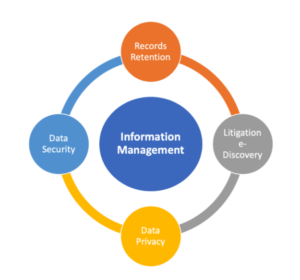Data Map Applications

Data Mapping to Support Litigation e-Discovery
Data mapping is an important tool when preparing for and responding to eDiscovery. In fact, data mapping is (sort of) required by the Federal Rules of Civil Procedure (FRCP). Rule 26(a)(1)(A)(ii) requires parties to create a description by category and location of all documents and electronically stored information the party has and may use to support its claims or defenses. Without the data data map, responding to a litigation Discovery Request can be an expensive “fire drill” for the organization’s litigation support manager or paralegal team members. And the data map also serves as the starting point for the early case assessment (ECA) process.
Data Mapping For Records Management Housekeeping
The Chorus Consulting data mapping project begins with the organization’s Business Unit Leaders identifying one or more subject matter experts (or record coordinators) to represent their department. The foundation for the data map is the organization’s list of primary and secondary record categories. From this list, the department subject matter expert is asked to select the categories of data/documents that their department creates or maintains. For each category selected, the subject matter expert is presented with a list of mandatory questions (e.g., the source, format, business use, storage location or application for each category selected). The application includes three key questions for records management housekeeping: 1) How long are you currently saving this category of information – Less than 2 years, 2-10 years, or more than 10 years; 2) Are documents in this category sent to offsite storage- yes or no; and 3) In what format(s) are documents saved – electronic, hardcopy or both.
Data Mapping For Data Privacy Compliance
A data map also helps organizations better understand the applications and shared drive folders that contain personal or sensitive data. Although, Europe’s GDPR and California’s CCPA laws and regulations do not explicitly mention a requirement for a data map, it is widely recognized that Article 30 in the GDPR does require an organization to create a data inventory (map) and keep it current. The up-to-date data map will greatly help the organization respond to a data subject access request for information or deletion of information within the mandated period of time (e.g., organizations must respond to a GDPR “data subject access request” within 1 month).
Data Mapping For Data Security Compliance
You can’t protect data that you don’t know exists, or with whom it is shared. The data mapping exercise is the most efficient means to learn about the nature and business use of your stored information from application owners and users. Department subject matter experts will document the source of their data, where it is being saved, the business necessity for the data, as well as with whom the data is shared, inside and outside of the organization.


